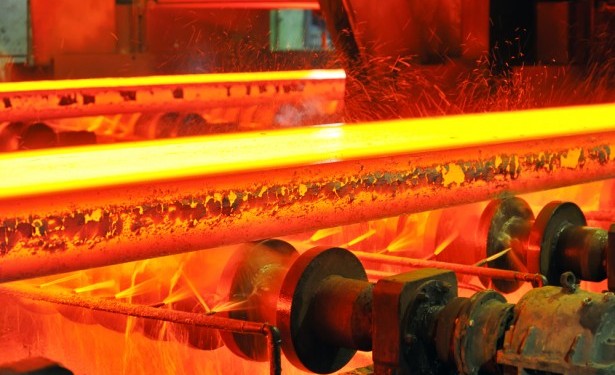Cheap natural gas unleashed from previously unreachable shale sources could eventually provide a boost to U.S. steel manufacturers, but the benefits have not shown up in their bottom lines just yet.
A recent Credit Suisse Research Institute report, entitled “The Shale Revolution,” said ongoing development of shale natural gas “is set to unleash significant capital spending” that stands to benefit the steel industry and others in the long term. For one thing, steel piping is a key component in the exploration process, as it can take thousands of feet of pipe to reach underground shale rock formations. In addition, any future rebound in domestic manufacturing that occurs as a result of inexpensive, abundant natural gas could also increase demand for steel. Finally, steel companies could benefit in the long run if cheap natural gas lowers the cost of energy inputs.
“In terms of demand, steel will play an important part in both oil and gas infrastructure, including many specialist applications,” the report said. “On the supply side, steelmakers would benefit from using natural gas in the steel-making process, with potential material cost savings and margin enhancement if they can retain them.”
For now, though, the potential remains largely theoretical. An abundance of domestic shale resources has pushed natural gas prices down, and rig counts have actually been declining since late last year. The U.S. continues to import large amounts of steel, and new capacity is coming online domestically, creating oversupply issues that have kept steel prices weak.
Foreign competitors enjoy large steel inventories and low labor costs, making it likely that steel imports will continue. That is among the reasons industry players are cautious about domestic growth projections.
At the same time, large steel companies have made several significant investments in the United States recently. A $750 million plant built by North Carolina-based Nucor Corp is scheduled to start operating later this year in Louisiana. Austrian steelmaker Voestalpine AG plans to build a roughly $700 million plant to make an intermediate material for steel in Texas, and Vallourec SA’s V&M Star spent $650 million on an Ohio plant to supply tubular steel pipes specifically for oil and gas development.
The industry itself is hopeful about the potential natural gas holds.
“Natural gas is a game changer for our industry,” American Iron and Steel Institute (AISI) President and CEO Thomas Gibson told The Financialist in an email. “The industry is developing new options and technologies for the production of steel as a result of natural gas availability.”
The steel industry is vulnerable to unforeseen economic pressures, such as rising energy costs, and some manufacturers have opted to explore alternative production methods, such as using natural gas instead of coal. Either energy source can be used to purify, or remove oxygen, from iron ore – a key ingredient in steel. Coal was the industry go-to method, but that’s changing as natural gas from shale sources becomes a cheaper option than coal.
“As an energy-intensive industry, the domestic steel industry’s international competitiveness depends on our ability to capitalize on the discovery and development of North America’s shale resources,” said Gibson, of the AISI. “Our industry consumes large amounts of natural gas and will benefit from the increased supply resulting from shale production, which keeps gas both reliable and available at a low cost.”
For the time being, the U.S. holds a competitive advantage in producing shale gas. The Boston Consulting Group expects U.S. natural gas to be about 50 to 70 percent cheaper than in other large developed economies such as Japan, China and Europe.
“The ability for Europe and China to get mass quantities over the next few years is unlikely, so the U.S. will have the advantage,” said Hal Sirkin, a senior partner in BCG’s Chicago office. Sirkin said it would take “many years” before other countries were able to mass-produce shale gas.
Sirkin said it is too early to anticipate what will happen with steel industry investments, partly because the prices of iron ore remain volatile. One thing, however, seems certain.
“There’s clearly going to be a reduction in steel production costs,” Sirkin said.


No comments:
Post a Comment